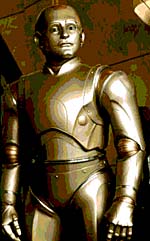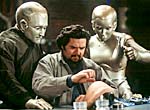Bicentennial Man
 for language and some sexual content.
for language and some sexual content.
Reviewed by: Timothy Blaisdell
CONTRIBUTOR
| Moral Rating: | Average |
| Moviemaking Quality: |
|
| Primary Audience: | Adults Teens |
| Genre: | Sci-Fi Drama |
| Length: | 2 hr. 11 min. |
| Year of Release: | 1999 |
| USA Release: |


| Featuring |
|---|
| Robin Williams, Sam Neill, Embeth Davidtz, Wendy Crewson, Oliver Platt |
| Director |
|
Chris Columbus |
| Producer |
| Wolfgang Petersen, Gail Katz, Laurence Mark |
| Distributor |
Critics don’t seem to like “Bicentennial Man”, and I’m really not sure why. Many people are saying it’s a rip-off of Lt. Commander Data from “Star Trek: The Next Generation,” or the film “Short Circuit”. I’m not sure whether to laugh or cry at such ignorance. That’s like picking up a copy of William Shakespeare’s “Romeo and Juliet” and saying it’s a rip-off of the latest romance film you happened to have seen! “Bicentennial Man” is a science fiction classic. When first published, it was unique and the theme of what it means to be a human being was unusual and imaginative. It sparked the imagination of many, and through the years science fiction writers (and movie makers) have borrowed its ideas over and over again.
The basic plot (without giving away too much) is that, in the near future, a wealthy family purchases a robotic servant—a household appliance built for doing household chores and such. The serial number of the device begins with the letters NDR, and thus the name “Andrew” is given to it by the youngest member of the household. Because of a fault in this particular robot’s “positronic brain” (a term that Asimov invented, not the creators of “Star Trek’s” Commander Data), Andrew begins doing things he was not programmed for. He develops the ability to create beautiful (and valuable) art and woodworking talents. He exhibits feelings and a desire to learn and grow. As Andrew grows in awareness, he begins to realize that he will never be accepted as an equal in the world of humans as long as he looks like a machine.
Gradually, as technology advances over 200 years, Andrew at first purchases, and later invents for himself upgrades and adaptations for his body that make him more human looking, but regardless of what he does, the humans he cares for the most continue to think of him as a machine, and therefore are incapable of returning love and affection to him.
This film is all about Andrew’s long quest to find out what it means to be a “man”. It follows the book almost perfectly, with a few exceptions thrown in to make use of Robin Williams comedic talents (however, the director thankfully did not let Williams loose, and the comedic elements are nicely done). I enjoyed it a lot.
“Bicentennial Man” has very little to object to in the way of sex or violence. There is one scene where Andrew is learning to express strong emotion in his speech, and is repeatedly told to use the word “sh--”. Also, toward the end of the film (warning! minor spoilers ahead!) Andrew attempts to get permission from the government to marry a woman. The government refuses to recognize the marriage, but Andrew and the woman apparently move in together anyway. There is no nudity, however at one point the couple is shown in bed, but everything is well covered and the two are merely talking. There is also a scene where someone is describing the sexual experience, but it is done more out of awe and respect, and in symbolic terms.
Some may be offended by the whole idea of an artificially created machine achieving the status of “human”. However, the question of whether Andrew did actually become a living being or not is left to the viewer to decide (but it is quite apparent that the viewer is intended to believe he did). As a Christian, and as a professional software engineer, I find it impossible to believe that something like Andrew could ever be created by men. But the point of the story (in my opinion) is not so much to tell a story of what might actually happen as to arouse thinking about what makes a person a person, and what is important and wonderful about being one.


While Andrew did not openly rebel against his owners he did reflect the sins of man: “Andrew” wanted to better himself. (Did not the apple promise KNOWLEDGE to Adam and Eve, and they would be more than what God had created them as?) When Andrew (a machine) was not allowed to marry, he simply lived with his lover (a woman). (What do we do today but take a lover as we desire and commit adultery… “for they give up that which is natural and take on that which is an abomination.”)
When Andrew is before the counsel, in justification he offers the works of his own hands. “Are not the organs ‘I’ have created, in you (the judges kidney), and are you not like ‘ME’ now.” Andrew is told by his lover “There is an order to things (death) which is natural.” The last time I checked, God’s Word says death is NOT natural for man, but the result of sin. When Andrew dies his wife orders the android nurse to commit murder and pull the plug on her support systems so she will die. Do we now support the killing of our elderly just because they are old? I see a movie of a man justifying his own works, a daughter that flaunts an active sex life to her mother, a mother that is unwilling to confront her daughter’s rebellion, and a father that is unwilling to take on responsibility to raise or discipline his children (“I am hoping it is a faze”)… [1½/3]

